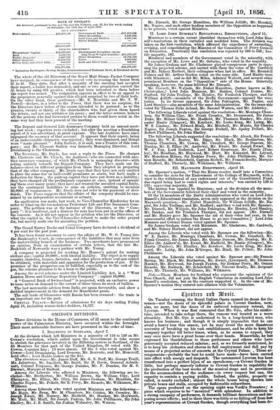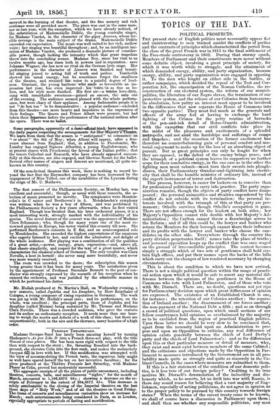%#tairts Knit 311usir.
On Tuesday evening, the Royal Italian Opera opened its doors far the season—not the doors of its splendid palace in Covent Garden, now, alas, no more but the doors of its enforced temporary retreat, the Lyceum. When it was first rumoured that Mr. Gye after his misfor- tune, intended to take refuge there the rumour was Leated as a mare absurdity. But Mr. Gyre is understood to be a long-headed man, who knows his business ; and though it is simply impossible that he can avoid a heavy lose this season, yet he may avoid the more disattrons necessity of breaking up his vast establishment, and be able to keep his company together till better times, when, as he seems to expect, they may once more have a great home over their heads. Meanwhile, he has expressed his thankfulness to those performers and others who have generously accepted reduced salaries ; and, as we formerly mentioned, he is to keep his orchestra and chorus in full employment and full pay by means of a projected series of concerts at the Crystal Palace, These ar- rangements—probably the best he could have made—have been carried into effect with energy and despatch. The untenanted Lyceum has been transformed into a perfect bijou of an operahonse —a Covent Garden in little, but perhaps scarcely inferior to Covent Garden in capability for the production of the best works of the musical stage and in provisions for the accommodation of the audience—in every respect but one, the capacity to contain a paying public. Indeed, the public, properly- so
i called, s nearly excluded ; almost the whole house being thrown into private boxes and stalls, occupied by fashionable subscribers.
The opera produced on the opening night was Verdi's Trovatore ; piece which requires to be " mounted " with splendour. In addition to a strong company of performers, it demands brilliant decorations and im- posing scenic effects ; and in these there was little or no falling-off from last year's representation at Covent Garden, though everything had been de- stroyed in the burning of that theatre, and the fine scenery and rich costumes were all provided anew. The piece was cast in the same man- ner as last year, with the exception, which we have already noticed, of the substitution of Mademoiselle Didiee, the young contralto singer, for Madame Viarclot, in the character of the gipay Azueena, whose ter- rible revenge is the main subject of the drama. Mademoiselle Didiee exceeded our expectation. The music was well suitedto her rich, mellow voice ; her singing was beautiful throughout; and, by an intelligent imi- tation of Madame Viarclot, she produced a dramatic picture of consider- able power, though lacking the intensity which that great tragedian threw into the concluding scenes. Madame Ney, since her visit to us twelve months ago, has risen both in powers and in reputation : save Johazum Wagner, she has now no rival on the German lyric stage. Her performance in the character of Leonora was finished and beauti- ful singing joined to acting full of truth and pathos. Tamberlik showed his usual energy, but he sometimes forgot the smallness of the theatre, and strained ltic voice to a painful degree of loud- ness. Graziani, the young baritone' whti rade so favourable an im- pression last year, has even improved : us' troien lie as fine as be- fore, and his style more finished. His first air—a iehtlee love-ditty, sun with remarkable sweetness—gained an encore, the only one of the evening. The audience seemed pleased with the whole perferin- ance, but were chary of their applause. Among fashionable people it is not "de bon ton" to be demonstrative : a popular audience—excluded. from this theatre—are more hearty and impulsive in the expression of their feelings. The Queen and Prince Albert were present, but had taken their departure before the performance of the national anthem after the opera. There was no ballet.



























 Previous page
Previous page